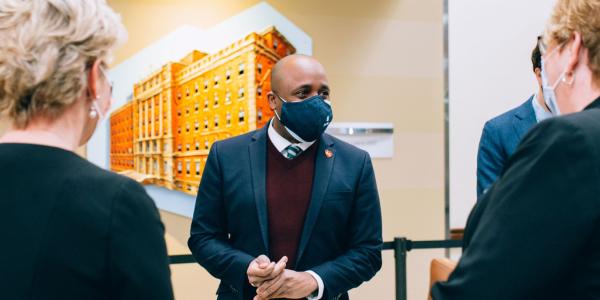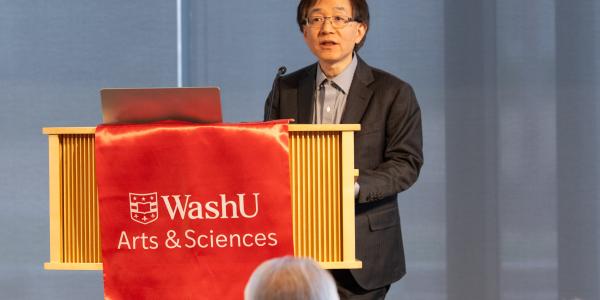Quinton Lucas, AB '06, reflects on his time at WashU, the role of American cities in politics, and how his background prepared him to be the mayor of Kansas City.
Quinton Lucas, AB ’06, thought he was just keeping a journal about his internship in the Kansas City mayor’s office for class credit during his junior year at Washington University. Then Beth Wilner, a postdoctoral lecturer and the pre-law advisor at the time, suggested he turn his notes into a paper and submit it to an academic journal. Intrigued, Lucas began polishing his thoughts. He met with Wilner several times that semester to get his paper in shape for possible publication.
“I still remember she taught me a new word. She said, ‘What’s the dénouement?’ And I was like ‘the what?’” Lucas said, laughing. “I had to look it up first.”
He says that conversation got him thinking – what was the point he was trying to make? “I’ve thought about this in my writing ever since – as a lawyer, in my speeches as a politician. What is the point? What am I trying to get to?”
Wilner, who is now the director of college counseling at a high school in Concord, North Carolina, fondly remembers her interactions with Lucas.
“Quinton had an under-the-radar intensity,” she said. “Each time he entered my office, he wore a huge smile and offered pleasantries to ask how I was doing. Once we moved past the greetings, his intensity would come out. He would methodically outline his thesis, the data, his thinking around what he was observing, and any updates he had discovered in the interim. It was compelling to listen to Quinton. I remember wondering if I was even helping him!”
Before attending WashU, Lucas had spent most of his life in Kansas City’s urban core, raised by a single mom. And although he had moved often as a child and experienced homelessness, he remained focused on his schoolwork. In fact, the youngest of three earned the nickname “professor” at 10 years old.

Lucas’ paper on value politics in Kansas City was successfully published in the Journal of Politics and Society, and that experience solidified his identity as a scholar of the American city. Now, as the mayor of Kansas City, Missouri, Lucas believes strongly that cities have the power to make a real and lasting impact on the world. He points to the strengthening influence of city politics in response to fluctuation in state and federal power over the past century.
“I think part of it is because the public really wants things done, but in a different way,” he said. “They want us to address homelessness. They want us to address violent crime. They want us to address business development, and equity, and housing. And those are areas where the solutions are really rising up from cities.”
He also believes part of his role as mayor is to shine a light on the problems in Kansas City. He publicized racially charged death threats he received to show any doubting citizens that racism is prevalent in the region. He directed the city manager to highlight any discriminatory language in the city’s code of ethics. He worked to remove marijuana violations from the code of ordinances and to create a system in which unpaid parking tickets no longer lead to incarceration – both issues that disproportionately harm poor Kansas Citians. “We have to show our current DNA,” he said. “If we’re going to be proud of our Chiefs, we also need to recognize our blemishes.”
This belief stems partly from his time spent studying in Cape Town, South Africa, as an undergraduate at WashU. Many of his classmates had lived through apartheid, and racial inequities were clear to everyone and freely discussed. Sugarcoating wasn’t really an option, and Lucas appreciated that.
While in South Africa, Lucas would wake up early and listen to NPR News and the BBC World Service. He heard the coverage of Hurricane Katrina hitting the Gulf Coast from his dorm room in Cape Town. “It was interesting catching American news and hearing everyone else respond,” he said. “You learn so much about your own country’s strengths, but also our shortcomings when you go somewhere else.”
"The public wants us to address homelessness. They want us to address violent crime. They want us to address business development, and equity, and housing. And those are areas where the solutions are really rising up from cities."
“I got to engage on issues that we spoke about in the classroom in St. Louis, but when you live with people whose experiences are different – you’re talking to someone from Somalia about American intervention or a woman whose dad was killed in Mogadishu – those types of conversations really changed my perspective.”
Lucas hopes that one day his son, who was born in April, will have the same type of intellectual encounters he had studying in South Africa and at WashU.
“There are always things you’d change in college – like to win a bunch of awards or something,” he said. “But one thing I’d want to be consistent is the intellectual rigor that I had. I think it has made me a much better mayor, consumer of information and entertainment, and human being.”
When Kansas City was hit with the COVID-19 pandemic just six months after Lucas was sworn in as mayor, he was thankful to have staff with backgrounds in the arts and sciences.
“We had to step back, and we had to think, and we had to think creatively,” he said. Historians looked up the 1918 flu pandemic, mask mandates, and the politics at the time; sociologists advised on how to get messages out to a fearful community; and mathematicians created statistical models. “There are so many tools you learn from a liberal arts education.”
For Lucas, the pull toward public service started while he was in South Africa and never went away – even after stints as a lawyer and a professor at the University of Kansas. “I had lived in a small town in Kansas, lived in the inner city of Kansas City, experienced home- lessness, I went to this great university at WashU,” he said. “I had so many experiences in so many crowds that I thought it was vital for me to do that connecting for our society.”





